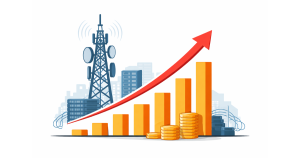India is on track to achieve a momentous milestone in its digital transformation journey, with the digital economy expected to surpass $1 trillion by 2025-2026, as projected by the Minister of State for Electronics and IT, Shri Rajeev Chandrasekhar. This ambitious goal reflects the country’s growing prowess in the digital space and highlights the significant opportunities that lie ahead.
The rapid growth of the digital economy in India can be attributed to several factors, including increased internet penetration, widespread adoption of smartphones, favorable government policies, and a vibrant startup ecosystem. These elements have collectively propelled India’s digital transformation and positioned the nation as a global technology hub.
The Minister of State for Electronics and IT emphasized that India’s digital economy is witnessing remarkable expansion across various sectors, including e-commerce, digital payments, fintech, health tech, edtech, and cybersecurity. The COVID-19 pandemic further accelerated the adoption of digital technologies, prompting businesses and consumers alike to embrace digital solutions for various needs.
The Indian government has played a pivotal role in fostering the growth of the digital economy by implementing policies and initiatives that promote digital inclusion, innovation, and entrepreneurship. Initiatives such as Digital India, Startup India, and Make in India have created an enabling environment for businesses to thrive and drive the digital transformation agenda.
The projected $1 trillion digital economy presents immense opportunities for job creation, entrepreneurship, and economic growth. It will fuel innovation, attract investments, and contribute significantly to India’s GDP. The digital economy has the potential to empower individuals, bridge the digital divide, and enable inclusive growth across urban and rural areas.
To achieve the ambitious target, concerted efforts are required from various stakeholders, including government, industry, and academia. Collaborative measures such as infrastructure development, skill enhancement, fostering research and development, and promoting digital literacy will be crucial in realizing the full potential of India’s digital economy.
The growth of the digital economy also brings with it challenges related to cybersecurity, data privacy, and digital governance. Addressing these challenges will be vital to ensure a secure and trusted digital ecosystem that safeguards the interests of individuals, businesses, and the nation as a whole.
As India continues its digital transformation journey, it is poised to emerge as a global digital powerhouse, driving innovation, creating new business models, and transforming industries. The projected $1 trillion digital economy milestone is a testament to India’s immense potential and its ability to embrace technology for socio-economic development.
In conclusion, the vision of a $1 trillion digital economy by 2025-2026 underscores India’s determination to become a digital-first nation. With a supportive policy framework, innovative solutions, and a vibrant ecosystem, India is well-positioned to unlock the immense opportunities presented by the digital revolution and cement its status as a global leader in the digital economy.
Last Updated on: Monday, May 22, 2023 6:43 am by Anu Priya | Published by: Anu Priya on Monday, May 22, 2023 6:43 am | News Categories: Business, Economy


